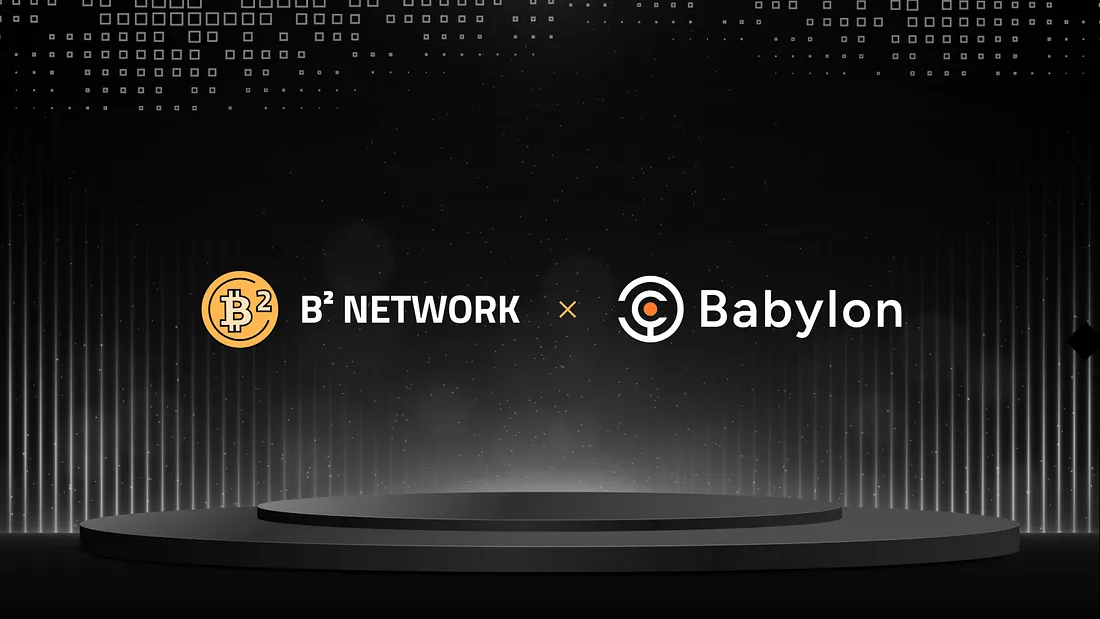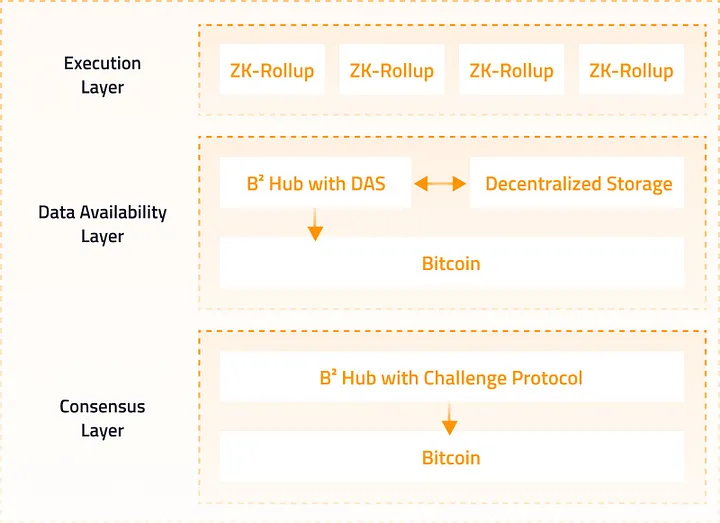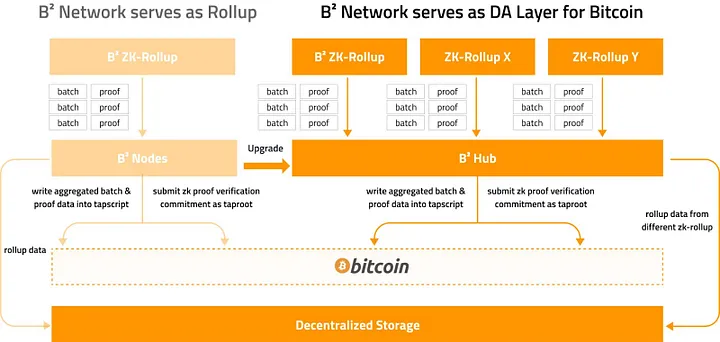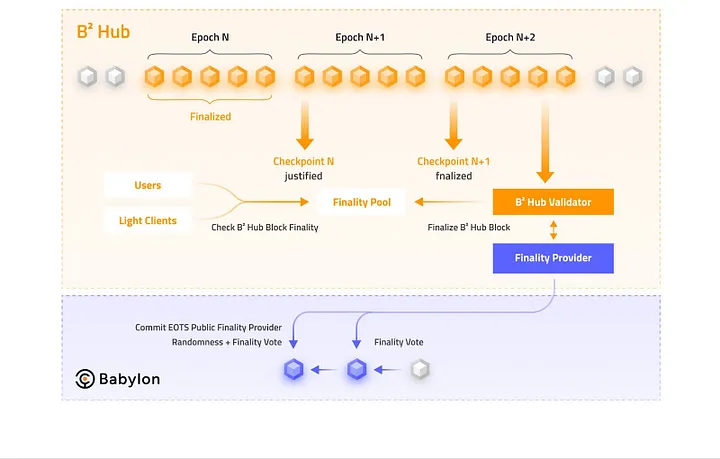In March of this year, B² Network announced a noteworthy new partnership with Babylon Chain through its official Twitter account. The collaboration aims to elevate the standardization and expansion of the Bitcoin network by introducing the Bitcoin Data Availability (DA) layer B² Hub, in conjunction with Babylon's Bitcoin security staking service. This partnership seeks to enhance the security of the PoS network by utilizing BTC staking, while also supporting BTC liquidity staking (LSD) and restaking functions.
Babylon has introduced a Bitcoin staking system, including security mechanisms such as time locking, extractable one-time signatures (EOTS), and multi-signature consensus for final rounds, to ensure the secure operation of the PoS network. The collaboration with Babylon not only enhances the security of B² Hub but also promotes ecological interoperability between the two platforms, bringing new BTC restaking benefits to users. Therefore, B² Hub's contribution to the Bitcoin Layer2 ecosystem is similar to combining Celestia as the DA layer in the Ethereum Layer2 ecosystem with Eigenlayer's restaking function.
Furthermore, as the cryptocurrency with the highest market value, the majority of circulating bitcoins in the market are currently idle. Babylon's BTC staking solution allows holders to stake their idle BTC to enhance the security of the PoS network. Coupled with the modular Bitcoin Layer2 B² Network, BTC holders can invest their assets in various decentralized applications (DApps) within the B² Network ecosystem, thereby enhancing Bitcoin's liquidity.
This collaboration significantly strengthens the security of B² Network's core component, B² Hub, by integrating Babylon's BTC staking feature. It not only brings BTC LSD and Restake use cases to B² Network users but also significantly enhances the security and functionality of the entire Bitcoin Layer2 network, heralding a more active and interconnected Bitcoin ecosystem.

Unlocking the Potential of Bitcoin: The Innovative Collaboration between B² Network and Babylon Chain
With Bitcoin's market value reaching $1.4 trillion, its role is gradually shifting from a mere "store of value" to a dynamic asset. However, until 2023, Bitcoin primarily participated in the DeFi field through a limited avenue, Wrapped Bitcoin (WBTC), with a market value of only $11 billion, less than 1% of its total market value. It is worth noting that the on-chain asset issuance model BRC20, driven by the Ordinals protocol in the past two years, has seen its market value climb to $2.65 billion, indicating the untapped liquidity and enormous ecological potential of the Bitcoin network.
To unleash this potential, it is necessary to empower the Bitcoin ecosystem. While some early Bitcoin supporters (OG) insist that Bitcoin should maintain its simple and pure network structure, leaving more complex interactions to the Lightning Network, the "new voices" within the Bitcoin community believe that the lack of on-chain activity may actually pose a threat to Bitcoin. For example, during the Bitcoin halving event, the reduction in block rewards directly reduces miners' income. Without sufficient economic incentives, the number of miners may decrease, thereby reducing the decentralization and security of the Bitcoin network. One way to address this issue is to increase on-chain activity to boost miners' earnings from transaction fees, a point that has been confirmed by the Ordinals protocol and the practice of BRC20.

To unleash the potential of the Bitcoin ecosystem, the collaboration between B² Network and Babylon Chain proposes a modular blockchain solution. The current Bitcoin network adopts a simple UTXO model, making modular design particularly important in supporting basic payment functions. A complete public chain needs to include multiple components such as settlement layer, data availability layer (DA layer), execution layer, consensus layer, and cross-chain communication layer. As shown in the following figure, through such modular design, B² Network hopes to enhance the scalability and functionality of the Bitcoin network, enabling more developers to develop and run various DApps on the Bitcoin network.

B² Network's modular solution is mainly implemented in two phases. In the first phase, B² Network will run its own B² Rollup on B² Hub, which is a ZK Rollup based on Bitcoin, aiming to increase transaction speed and expand the diversity of applications. In the second phase, B² Network will allow anyone to launch a custom ZK Rollup on B² Hub, providing support for all developers who wish to build Layer2 on the Bitcoin network.
In terms of security, B² Hub adopts a PoS mechanism to ensure the network's security by validating staked assets (BTC and B² tokens) and ensuring the data availability and validity of state transitions through B² Hub's validators. Additionally, each block needs to undergo two verifications through Babylon's Bitcoin staking protocol and Bitcoin timestamp protocol to ensure the final confirmation of the block's security and reliability.
Through such technological innovation and strategic collaboration, B² Network and Babylon Chain have not only brought new growth momentum to the Bitcoin ecosystem but also explored new possibilities for the development of blockchain technology, demonstrating the potential for Bitcoin to realize more dynamic financial functions beyond being a store of value.
Advanced Security and Scalability: Technical Analysis of Babylon and B² Network
Babylon Chain has introduced an innovative Bitcoin security protocol, the core of which is a scalable Bitcoin staking protocol designed to ensure the security of decentralized economies. This protocol allows users to stake their Bitcoin directly on the Bitcoin network without the need for a third-party address. This unique non-custodial staking process enhances users' control over their assets and utilizes the security of the Bitcoin network itself to protect other external PoS networks.
Babylon's Bitcoin staking mechanism includes an advanced security feature called Extractable One-Time Signature (EOTS), which automatically exposes the private key of the party involved in certain misconduct. This mechanism is implemented through double signatures on external PoS networks, similar to the double payment detection in traditional banking systems. When a node or validator attempts to sign two different blocks at the same block height, their private key will be exposed, allowing the related Bitcoin to be remotely slashed. This approach greatly enhances the security of the network and ensures the compliance of node behavior.

B² Network has created the first Bitcoin Rollup using zero-knowledge proof technology, greatly improving transaction speed and expanding the diversity of DApps. It reduces the cost and time associated with on-chain proof by integrating B² Hub (DA layer), while ensuring the security and privacy of transactions. B² Network's Rollup technology allows for the execution of more complex smart contracts and applications while maintaining the decentralization and security features of the Bitcoin network.
Through the collaboration of these two projects, B² Network has enhanced its network structure's security layer with Babylon's staking protocol, not only making B² Hub more secure but also introducing a completely new security dimension to the entire Bitcoin ecosystem. The combination of Babylon's EOTS signature and Bitcoin's native Schnorr signature mechanism provides unprecedented security for on-chain activities, laying a solid foundation for the construction and operation of potential DeFi and other DApps in the future.
This combination of innovative technology and close collaboration not only brings revolutionary security enhancements to the Bitcoin network itself but also sets new standards for the entire crypto industry's development. With the further development and application of these technologies, we can anticipate the rise of a more secure, efficient, and diverse Bitcoin ecosystem.
Summary
This collaboration focuses on enhancing the security and scalability of the Bitcoin network while activating the economic potential of BTC. B² Network provides new functionality and higher transaction efficiency for the Bitcoin network through its advanced B² Hub and zero-knowledge proof-based Rollup technology. Meanwhile, Babylon Chain introduces an innovative Bitcoin staking protocol that greatly enhances the security of the Bitcoin network and supports external PoS networks through its unique security features such as EOTS.
This collaboration not only enhances the infrastructure and security framework of Bitcoin but also opens up new possibilities for developers and users, allowing Bitcoin to better integrate into the modern financial system. With the implementation and improvement of these technologies, it is expected that the Bitcoin network will see broader applications and deeper market participation.
免责声明:本文章仅代表作者个人观点,不代表本平台的立场和观点。本文章仅供信息分享,不构成对任何人的任何投资建议。用户与作者之间的任何争议,与本平台无关。如网页中刊载的文章或图片涉及侵权,请提供相关的权利证明和身份证明发送邮件到support@aicoin.com,本平台相关工作人员将会进行核查。




